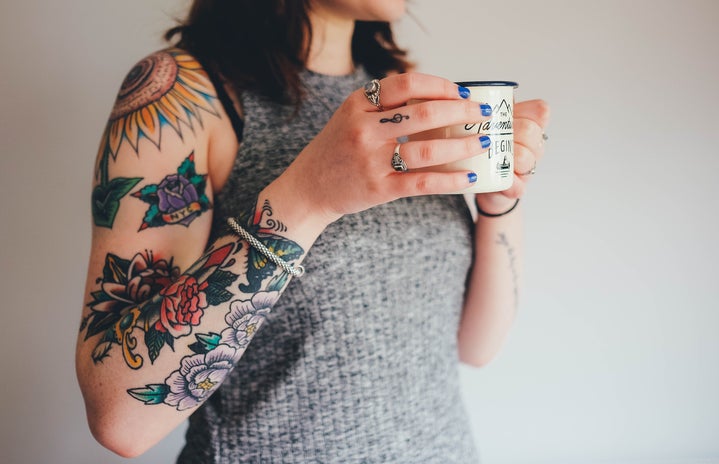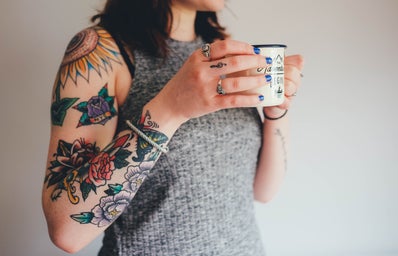Tattoos have long been seen as taboo within society, a rebellious form of expression in permanent pieces of artwork etched into the skin. However, in recent years, we’ve seen an increase in people getting inked, creating a newfound acceptance of the art form. We’ve grown more comfortable with tattooed sleeves in workplaces and at family gatherings; they have become an anchor in many people’s growing self-esteem and love for themselves.
Still, behind closed doors, the increasing number of women becoming tattoo artists are struggling to find a place in the traditionally male-dominated industry. They face an uphill battle of subtle (and sometimes not-so-subtle) workplace discrimination, perpetuated by the tough exterior and hardened stereotype the career invokes. In order to learn more about the process of becoming a tattoo artist while also being a woman, I interviewed 3 female tattoo artists on their stories and perspectives from their time working first-hand in the industry.
First-Hand Experiences
The first artist I asked to give a statement for this piece, Emma Carr, settled in Tempe, AZ, had faced a wide range of workplace experiences, all of which were made exponentially more difficult and rigid on account of her being a woman.
When asked about a particular time when she faced gendered discrimination, she shared, “The first shop I went [to] while looking for an apprenticeship explicitly turned me down for being a woman, [and said that] ‘it’s really hard for women in the industry’ and ‘you have to be tough.’”
Beyond that, she spoke about how when she finally did find a location that felt like a good fit, the owner had some unprofessional intentions, forcing her to quit and ultimately causing her to rethink her journey in the tattooing field.
Her story was heart-wrenching to hear. The emotion that she poured into the retellings of her struggles in this industry was more enlightening than I had anticipated, and really revealed the subjugation and silencing she, like many others, had faced in the scope of their careers. It became clear to me throughout the interviews I conducted that these women wanted a chance to share their stories because of how hush-hush the tattoo world really is about struggle. Again, the hardened exterior doesn’t really give opportunities for vulnerability to bloom.
“I was fired from an apprenticeship I started more recently because I thanked the owner’s wife for the opportunity [instead of him],” Carr told me. “[When he fired me] he claimed that I was being sexist towards men by giving his wife any credit for the decision-making around the shop.”
Similarly, artist and owner of Sanctuary Pittsburg, Susie Humphrey shared her experience, saying, “When I first started having a serious interest in tattooing as a career, I started bringing my art portfolio to shops and was told by countless shops that they ‘would never hire a female artist’ or ‘would never teach a woman how to tattoo.’ I was fortunate enough to find a few shops that welcomed women and had female shop owners.”
Humphrey has always made a point to help her clients feel accepted, having been open herself about being a bisexual woman and garnering a clientele of “around 80 percent female, including a large percentage of clients who identify as queer and trans.”
Another woman who agreed to speak out on her experiences, Maggie (a tattoo artist working out of Ottawa, Canada) shared a more familial perspective.
“I think tattooing has [always] been a largely male-dominated industry and is also very gate-kept by the people who have been grandfathered in it,” Maggie shared. “[A] young 20-year-old girl deciding to throw college out the window and take a crack at tattooing, well, I think a lot of my family and even some friends didn’t think it was a smart move or that I could do it.”
In this sense, the career is not only difficult to enter but also is subtly frowned upon in place of traditional college education, despite the wealth of opportunities available to both independent artists (like Maggie) and those working in shops.
Perspectives on Female Clients & Femininity
Beyond the experiences of female tattoo artists, discrimination still exists regarding women with tattoos, in particular. The lingering expectations of traditional femininity reinforce that women should be complacent and delicate, two ideals that seemingly contradict with rocking an arm of American traditional tattoos. One of the warnings tossed around to women getting tattoos is the same as when they contemplate cutting their hair shorter or letting their armpit hair (an entirely natural bodily function) grow out: that no men will find them attractive with those modifications, as if their entire notion of self-worth is enveloped in the ways men will perceive them.
When I asked Carr about her thoughts on the increasing number of women choosing to be tattooed, she said “I love to see more women getting tattooed. Tattooed women used to be judged as promiscuous or criminal. Now, tattoos are often seen as a form of self-expression [and] have gained respect as an art form, thanks to the open-mindedness of the newer generations.”
Similarly, Maggie supported the increase in women getting tattooed. “More women are feeling it’s okay to get tattoos, as they’ve been seen as more of a ‘man’s thing’ in the past. I think an important part of opening the whole industry up to all genders is making sure that every gender feels safe and comfortable first receiving tattoos.”
The way tattoos are societally viewed (oftentimes grouped under the umbrella of masculinity) is starting to change. “Tattoos aren’t just for bikers and outlaws anymore; tattoos can be seen across
every profession, not only blue-collar but white-collar as well,” Humphrey said in her response. “Having tattoos doesn’t change who you are as a person, as a woman, as a mother, or as a friend.”
In a feminine sense, tattoos can help women accept and love their bodies more readily, considering the rates of women suffering from eating disorders and self-harm, and it’s a highly effective way to create beauty where you may struggle to otherwise see it.
“I think a great aspect to highlight between femininity and tattoos is the ability to express yourself and feel beautiful, because we all know femininity isn’t really about being girly or pretty or pink and sparkly,” wrote Maggie. “It’s about being truly feminine and, to me, that means being yourself as a woman. Tattoos definitely make me feel beautiful and help me express myself as who I am.”
Humphrey spoke to me about her perspective on the matter, sharing her belief in bodily acceptance. “When I first started tattooing, I was told “don’t tattoo like a girl,” but that’s exactly what I did,” she said. “We want tattoos that make us feel more comfortable in our own bodies regardless of the style of tattooing. As women, we’ve been told most of our lives how to look, how to dress, [and] how to cut our hair, but getting tattooed allows us to take back control of our bodies.”
While there once existed a society of judgment towards tattooed women, we’re beginning to see a shift in their acceptance. I encourage you, the next time you’re walking around your campus or hometown, to count how many people around you have tattoos. I’m sure you’ll be pleasantly surprised to find that it’s more people than you would think. Hopefully, like people I know with tattoos indicate, the trajectory of our generation will be more accepting and loving towards the art and dedication that goes into tattooing.
More Info About the Artists
Susie Humphrey is located in Pittsburgh, at her tattoo shop Sanctuary Pittsburgh.
Her Instagram: @susiehumphrey and @sanctuary.pgh
Emma Carr is located in Tempe, AZ, and is an apprentice at Set in Stone Tattoo Co.
Her Instagram: @emmatheartiste
Maggie is an independent artist working out of Ottawa.
Her Instagram: @aphroditetattoos
We highly encourage you to check them out and give them a follow! Their artwork is as amazing as their words. Please continue to support female tattoo artists in your community.


